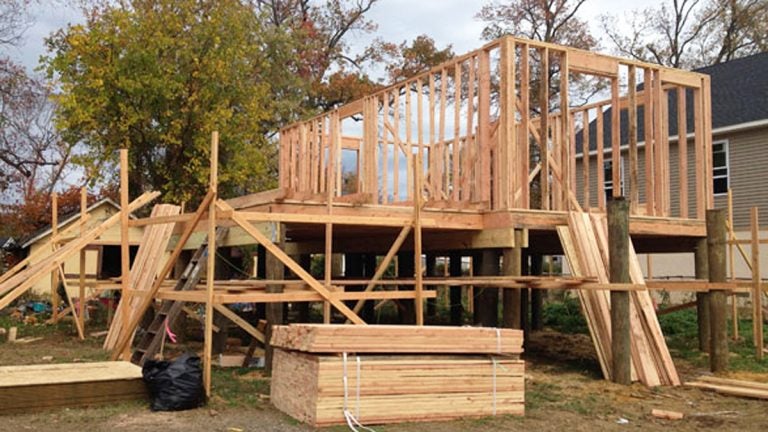Why many Superstorm Sandy homeowners were denied insurance coverage

Of the nearly 75,000 flood-insurance claims that New Jersey homeowners filed in the aftermath of Sandy, FEMA says that the National Flood Insurance Program had paid 58,055 policyholders a total of $3.9 billion as of early last month. But 6,532 claims were rejected and closed without payment, and throughout the region, some 1,500 cases remain bogged down in litigation, more than two years after the storm.
The reasons for the denials — as well as cases where people were dissatisfied with their payments — run the gamut.
Insurance industry spokespeople say that in many instances, homeowners were underinsured to begin with or were simply unclear that their policies didn’t afford them as much coverage as they had expected. Policyholder advocates – on the other hand – claim that while this may be true to an extent, insurance companies have alsowrongly rejected or underpaid many valid claims, basing their determinations on questionable and hastily conducted engineering inspections. Without the federal government releasing statistics breaking down the reasons why people were denied, it’s difficult to get a clear and complete sense of just what’s going on. Storm victims are cautiously optimistic that recent reforms to the NFIP could shine more sunlight on the process, increasing oversight and accountability and lessening potential problems in the future, but not everyone will be helped by those changes.
Homeowner Horror Stories
NJ Spotlight received over 100 responses from an online survey asking Sandy survivors about their flood insurance experiences.
A handful of people expressed satisfaction with their outcomes.
“I was very pleased with my settlement. They were quick to come out to inspect my home, and what they paid was very reasonable,” wrote one homeowner.
“We were lucky to have a kind and caring adjuster, who in the end was especially helpful,” said another resident.
But the overwhelming majority of respondents expressed varying degrees of anger and frustration.
Several homeowners who had leaking oil tanks wash up onto their property or experienced contamination from ruptured, offsite sewer pipes found out that their insurance policies had exclusions for pollution caused by flooding. Another respondent reported that her claim for remediation of mildew on her ceiling was denied on the grounds that it was above the water line and had grown after — rather than during — the storm. Others felt their insurance companies didn’t offer them enough, given the high cost of construction materials and labor in New Jersey. There were also numerous concerns that insurers hadn’t conducted thorough enough damage assessments.
“The insurance company had an engineer come to examine the property,” wrote Manahawkin resident William Scott. “The man never went into the crawl space to inspect the structural damages. We questioned his credentials as an adjuster. We hired an independent engineer at our expense and a public adjuster. Both totally disputed the insurance adjuster’s findings. Our engineer found very serious structural damages that were never addressed in the settlement.”
The single, biggest reason homeowners said they were denied was that their damage was allegedly pre-existing, due to factors including natural movement or subsidence of the earth.
“Definitely hundreds, but probably thousands of claims have been denied because the flood insurance companies basically said, ‘your home that’s been around for all these years has had foundation issues for a very long time,’” said George Kasimos, who advocates for storm victims through his group Stop FEMA Now. “You’re talking about homes that were sometimes just bought in the last three or five years that had a home inspection. So you know that people wouldn’t have bought the house if they had substantial damage.”
“It’s the worst thing I’ve ever seen,” agreed David Charles, who’s worked as an adjuster for close to four decades. For most of his career, he was employed by insurance companies, but after Katrina, he went off on his own, frustrated by changes in the industry. Now he represents homeowners and business owners, showing them “how to make the companies pay what they’re supposed to.” Since Sandy, he’s served as a consultant for law firms and spent a lot of time doing pro bono work on behalf of storm victims.
Earth movement is a valid exclusion for insurance companies to use, Charles said, but the federal regulations were originally drafted to provide exceptions for sinkholes, earthquakes, and subterranean water.
“The way that they’re using that exclusion now is poorly written, and I cannot believe that any politician would ever tell you that, ‘Yes, this is our intent, that we meant to write it this way so that we can deny these legitimate foundation claims,’” he said. “They’re using it as a hammer to avoid paying claims. It’s absolutely a scam!”
Insurance Industry Responds
To insurance industry insiders, it’s not surprising that some Sandy survivors were frustrated and caught offguard that their claims were denied or that they received much smaller settlements than they anticipated.
“It generally happens when there’s a major disaster in an area that hasn’t experienced a lot of flooding recently,” said Donald Griffin with the Property Casualty Insurers Association of America, an industry trade group.
“With Sandy, even though there was a storm the year before, in 2011, this storm was much more widespread. Most people had not looked at their policies and didn’t really understand them.”
Griffin said that each case is unique, so it’s hard to generalize, but insurance companies may have denied some claims because of disputes over whether flooding or wind was responsible for the damage. Also, some people likely didn’t purchase enough coverage to begin with, he added, and many didn’t understand that unlike homeowner’s insurance, flood policies don’t provide coverage for additional living expenses if residents are displaced from their homes.
As for the earth-movement exclusion, he noted that if the structure or the foundation of a home was somehow damaged prior to the flood and was not repaired, that could cause the home to collapse under pressure from water.
“I can’t speak to how many of those cases there were or what the specific circumstances were,” he said.
Some policyholders were also frustrated to learn that the personal contents of their homes would only be covered at a depreciated rate and that their flood insurance didn’t provide any coverage at all for damage to structures outside their homes such as decks, sheds, landscaping, and swimming pools (though detached garages would have been included).
“The lesson with all of this is that you really do need to understand what’s covered, what’s not and how much insurance you get before there’s a disaster,” said Jeanne Salvatore, spokeswoman for the Insurance Information Institute.
“A lot of time, people don’t really ask questions until there is a loss, and that’s a mistake.” She recommends that homeowners meet with their insurance brokers once a year to review their coverage and evaluate if it’s appropriate for their particular situation.
“Set up a time, write down all your questions, and find out what all your options are,” she said.
As for the widely reported complaints from Sandy survivors battling their insurance companies, both Griffin and Salvatore think they’re the exceptions to the rule. “I’ve been in the industry a long time, and after disasters, the vast majority of people are quite frankly very pleased with the service they get, the check that they get,” Salvatore said. “That part of the story doesn’t usually get told.”
Sorting Things Out
Among many homeowners, understanding exactly what their flood insurance policy does and doesn’t cover can be a challenge.
“The insurance companies stack the deck so far against you with all the minutiae in their contracts,” said Stop FEMA Now’s Kasimos, asking how anyone can be expected to read through 50 pages of fine print.
“It’s a full-time job,” he said. “Even now, two years later, you need a Ph.D. to understand your policy. The devil’s in the details, and that kills everybody.”
Donald Griffin agrees that most insurance policies can be difficult for the layperson to understand, but says companies don’t really have much of a choice.
“There was a movement among our industry a few decades ago to simplify policy wording,” he recalled, “because an insurance policy is a legal contract, and unfortunately with most legal contracts you enter into, you can’t read them very well. But our industry in the ‘70s and early ‘80s decided to push to make the policies more readable. So we did,” he continued.
“What happened was, the lawyers got a hold of this and came back and said, ‘You weren’t clear about this in your simplified language.’ If there’s any ambiguity, it’s interpreted in favor of the policyholder. So what has happened over the years is, everything we tried to simplify, we ended up putting back in, so now it’s more complicated to read.”
He also noted that the language of most flood insurance policies is written by the federal government, so individual companies don’t have the flexibility to change the wording on their own, even if they wanted to.
That said, Griffin added that the industry and the government are doing their best to reach out to policyholders. For example, the National Flood Insurance Program has a wealth of information on its website, floodsmart.gov. The Insurance Information Institute also provides resources on such topics as purchasing flood insurance,choosing an insurance company, and filing a claim after a disaster. They also havecreated a series of mobile apps to help with the process.
Calls for Changes
In response to months of pressure from storm survivors and lawmakers — as well as a case in Long Island where a judge ruled that an insurance company falsified an engineering report to deny coverage to one couple whose home was flooded by Sandy — FEMA announced a number of changes last month concerning the National Flood Insurance Program. The agency asked insurance companies being sued torelease their draft engineering reports to ensure the integrity of their claims decisions. Further, it asked Sen. Robert Menendez (D-NJ) to convene a taskforce to look into possible problems with payouts.
The private companies that process flood claims and issue payouts on behalf of the federal government are essentially tapping into taxpayer money, and critics have long pointed out that they’re under pressure not to pay a dime more than homeowners are due, or else those companies might have to pay that excess money back to the federal government. Some speculate that that fear has led to insurance companies systematically underpaying legitimate claims in the aftermath of Sandy. The task force will come up with recommendations of how to balance the sanctions in the future, so insurers would be penalized equally, whether they pay out too much or too little.
The information contained in the soon-to-be-released draft engineering reports could bolster the cases of hundreds of New Jersey residents who’ve been appealing their claims settlements in the courts. But there are also an untold number who fear that they may never see an equitable resolution.
William Scott is one of them. He’s the Manahawkin resident who disputes the findings of his insurance company’s original inspection, but he didn’t bother filing a lawsuit.
“We cannot afford another hit like a legal expense,” he said.
He was eventually able to rebuild his home, but in order to do so, he had to spend more than $60,000 of his savings and liquidate a large retirement account. He thinks the stress he’s gone through has also been a major contributor to recent health issues he’s experienced. Understandably, he’s still bitter.
“Flood insurance is nothing more than a huge consumer fraud,” he said. “They give you that false sense of security. They have you believe that you, the homeowner, are well covered when you purchase flood insurance. When you need it, they turn their backs and lie, cheat and fabricate where they must. Anything to deny the claim.”
_____________________________________________
NJ Spotlight, an independent online news service on issues critical to New Jersey, makes its in-depth reporting available to NewsWorks.
WHYY is your source for fact-based, in-depth journalism and information. As a nonprofit organization, we rely on financial support from readers like you. Please give today.




